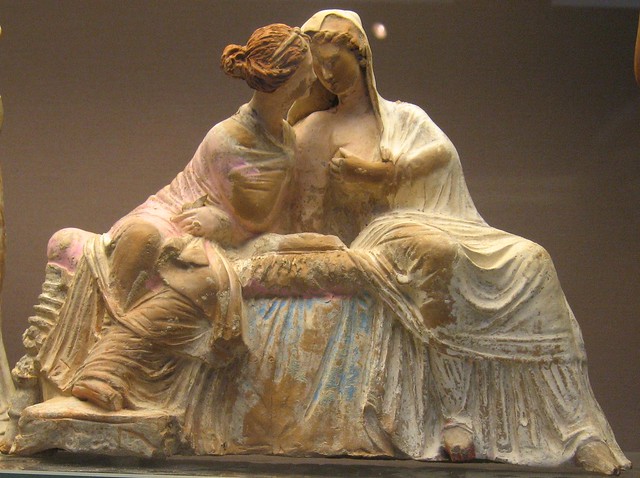DEMETER AND PERSEPHONE

DEMETER:
| Appearance: | Pleasant-looking mature woman, generally with a veil over her head though her face is visible. Often carrying wheat or her Horn. |
| Symbols and Attributes: |
An ear of wheat and the Horn of Plenty (Cornucopia). |
| Major Temple Site to Visit: | Demeter was revered at Eleusis, where initiatory rites called the Eleusinian Mysteries were performed for select participants. These were secret; apparently, no one ever broke their vows and described the details and the content of the rites is still debated even today. Eleusis is near Athens and can still be visited though it is regrettably surrounded by heavy industry. |
| Strengths: | Demeter controls the fertility of the earth as goddess of Agriculture; also gives life after death to those who learn her Mysteries. |
| Weaknesses: | Not one to cross lightly. After the kidnapping of her daughter Persephone, Demeter blights the earth and won't let the plants grow. But who can blame her? Zeus gave Hades permission to "marry" Persephone but whoops! didn't mention it to her or her Mom. |
| Birthplace: | Not known |
| Spouse: | Not married; had affair with Iason |
| Children: | Persephone, also known as Kore, the Maiden. Zeus is generally said to be her father, but at other times, it seems as if Demeter managed without anyone else involved. |
| Basic Story: | Persephone is snatched by Hades; Demeter searches for her but can't find her, and finally stops all life from growing on the earth. Pan spots Demeter in the wilderness and reports her position to Zeus, who then starts negotiations. Ultimately, Demeter gets her daughter for a third of the year, Hades gets her for a third, and Zeus has her services as a handmaiden the rest of the time. Sometimes this is a simpler split, with Mom getting six months and Hubby getting the other six. |
| Interesting Facts: | Some scholars believe that the mystery rites of Demeter derived from those of the Egyptian goddess Isis. In Graeco-Roman times, they were sometimes considered to be the same or at least strongly similar goddesses. Ancient Greeks might also dedicate sneezes to Demeter, similar to someone saying "God bless you!" An unexpected or timely sneeze could be thought to have oracular meaning as a message from Demeter, perhaps to abandon the idea under discussion. This may be the origin of the phrase "not to be sneezed at", not to be discounted or taken lightly. |
information from http://gogreece.about.com/cs/mythology/a/blmythdemeter.htm
PERSEPHONE:
| Appearance: | Persephone appears as a beautiful young maiden, just on the edge of womanhood. |
| Symbol or Attribute: |
The pomegranate. The narcissus, which Hades planted in a meadow to entice her to pluck it; pulling on the flower opened up the Underworld and Hades sprang out, carrying her off. |
| Strengths: |
Loving and lovely. |
| Weaknesses: |
Beauty so ravishing it attracts Hades' unwanted attention. |
| Spouse: |
Hades, with whom she must stay part of each year because she ate a few pomegranate seeds in the Underworld. |
| Some Major Temple Sites: |
The spooky Nekromanteion, still visitable today. |
| Basic Story: |
Hades springs out of the earth and captures Persephone, dragging her off to be his queen in the Underworld; her dad Zeus told him it was okay to take her as his bride, and Hades took him a bit literally. Hades was also her own uncle, which didn't make this exactly a myth of good family mental health. Her distraught mother Demeter searches for her and stops all foods from growing until she is returned. Even Zeus has to give in and help work out a deal - one myth says Persephone stays one-third of the year with Hades, one-third of the year serving as a handmaiden to Zeus, and one-third with her mother Demeter- ... an interesting ancient balancing of family, spouse, and career. The better-known tale equally divides her time just between hanging out with Mom and then ruling the underworld with Hades. |
| Interesting Fact: |
Persephone is also sometimes known just as Kore, or the Maiden. She was sometimes called "the maiden of the beautiful ankles". While most sources indicate Persephone was not happy to be "married" by Hades, others assert that she ate the pomegranate seed (or seeds) deliberately, as a way of breaking free from Mom, and that she was actually content with the final arrangement. |
information from http://gogreece.about.com/cs/mythology/a/mythpersephone.htm
Links to information about Demeter and Persephone
- http://www.arthistory.sbc.edu/imageswomen/papers/paolicchidemeter/demeter.html
- http://greece.mrdonn.org/greekgods/demeter.html
- http://ancienthistory.about.com/od/goldenfleece/a/goldenfleece6_2.htm
Demeter
- http://en.wikipedia.org/wiki/Demeter
- http://gogreece.about.com/cs/mythology/a/blmythdemeter.htm
- http://www.goddessgift.com/goddess-myths/greek_goddess_demeter.htm
- http://ancienthistory.about.com/cs/grecoromanmyth1/p/Demeter.htm
- http://www.theoi.com/Olympios/Demeter.html
- http://www.greekmythology.com/Other_Gods/Demeter/demeter.html
- http://www.paleothea.com/SortaSingles/Demeter.html
- http://www.greek-islands.us/greek-gods/demeter/
Persephone
- http://en.wikipedia.org/wiki/Persephone
- http://www.theoi.com/Khthonios/Persephone.html
- http://www.pantheon.org/articles/p/persephone.html
- http://www.greekmythology.com/Other_Gods/Persephone/persephone.html
- http://gogreece.about.com/cs/mythology/a/mythpersephone.htm